In this article:
Dandelion tea has long been known to have various health benefits. Dandelion (Taraxacum officinale) belongs to the Asteraceae family and is grown majorly in the northern hemisphere. It has been used extensively for healing purposes for a long time.
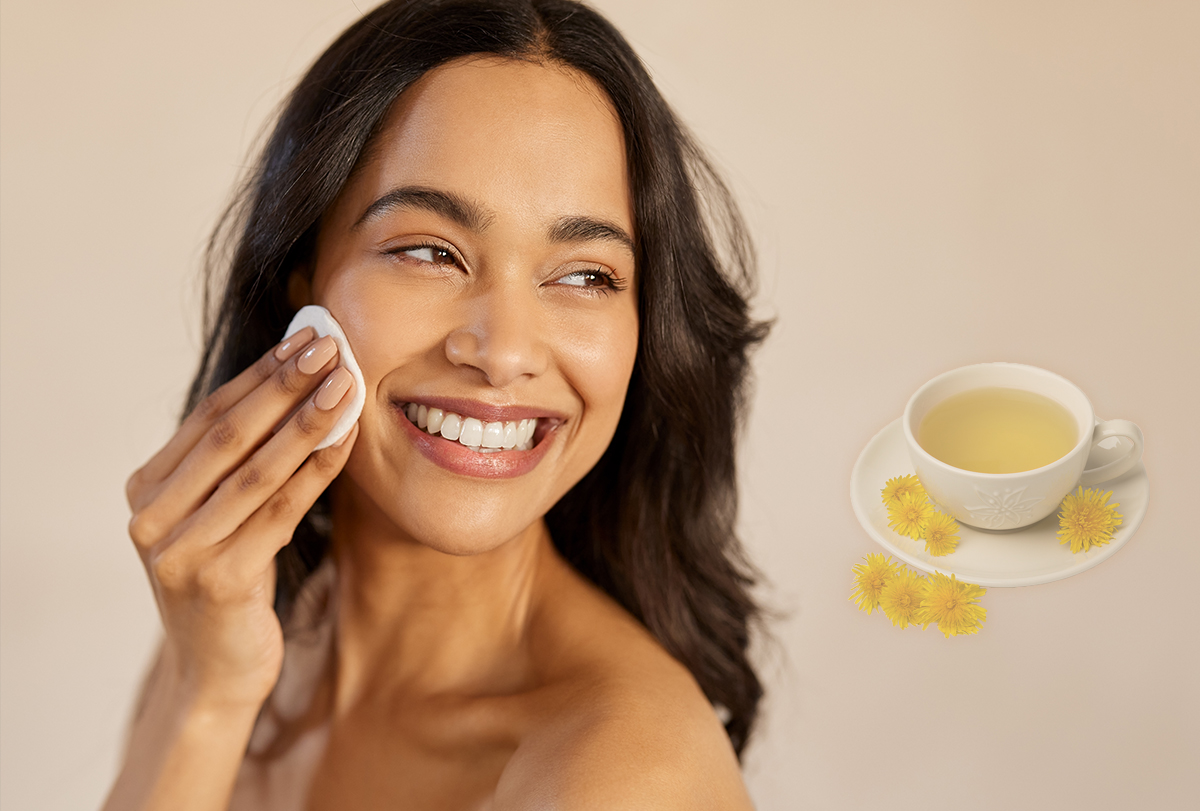
Researchers have demonstrated that dandelion is rich in β-carotene, which is found to safeguard cells from damage and oxidation.
The roots of dandelion contain carbohydrates (such as inulin), carotenoids (such as lutein), fatty acids, minerals, vitamins, mucilage, and pectin, all of which are great for maintaining overall well-being, including hair and skin health. (1)
Ways to Use Dandelion Tea for Your Skin and Hair
Here is an extensive guide on how to use dandelion tea for the maintenance of your hair and skin health.
1. Dandelion tea for acne
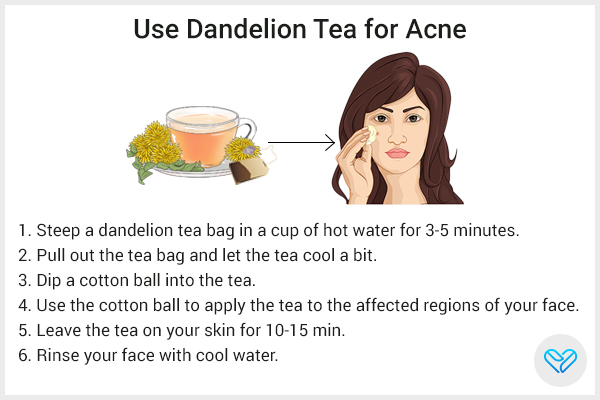
Acne is a pretty familiar skin problem and affects people of all ages. One of the benefits of dandelion tea is its ability to fight acne. (2)
How to use dandelion tea for reducing acne:
- Steep a dandelion in a cup of hot water for 3-5 minutes.
- Pull out the tea bag and let the tea cool a bit.
- Dip a cotton ball into the tea.
- Use the cotton ball to apply the tea to the affected regions of your face.
- Leave the tea on your skin for 10-15 min.
- Rinse your face with cool water.
2. Dandelion tea for darkened skin
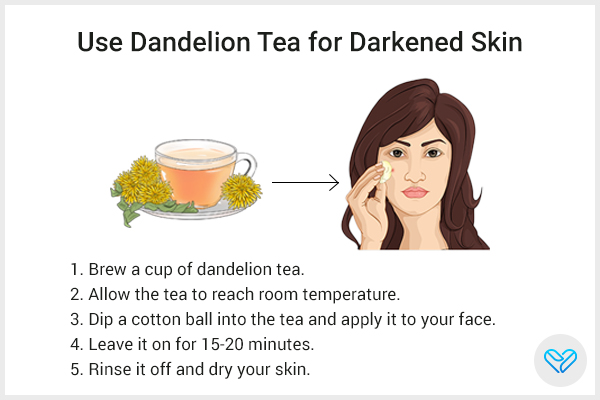
Dandelion tea is known for its ability to brighten skin by blocking the activity of the enzyme tyrosinase, which is responsible for producing melanin.
As dandelion inhibits tyrosinase activity, it disables skin pigmentation, which in turn reduces skin discoloration/ browning, making it a great natural agent for skin lightening. (2)
How to use dandelion tea for skin lightening:
- Brew a cup of dandelion tea.
- Allow the tea to reach room temperature.
- Dip a cotton ball into the tea and apply it to your face.
- Leave it on for 15-20 minutes.
- Rinse it off and dry your skin.
3. Dandelion tea for clogged pores
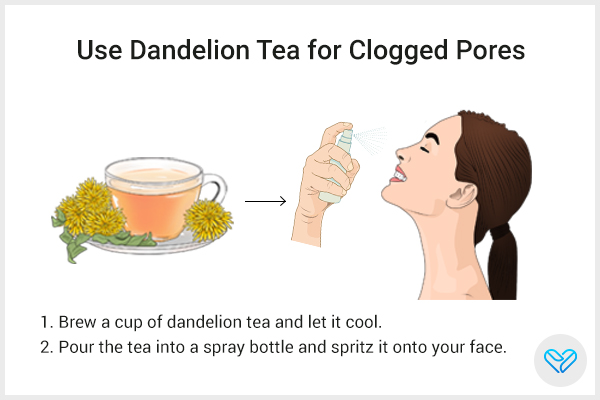
Dandelion tea can be used as a natural toner for your skin. It helps in unclogging the pores and reducing the appearance of pores.
How to make a dandelion tea toner:
- Brew a cup of dandelion tea and let it cool.
- Pour the tea into a spray bottle and spritz it onto your face.
It is best to use this dandelion toner after cleansing your face and before applying moisturizer.
4. Dandelion tea for sun damage and premature skin aging

Sun exposure is one of the major causes of skin damage and can even lead to premature aging of the skin, also known as photoaging. Dandelion tea can help protect your skin from UV rays, thereby reducing the chances of sun damage or photoaging. (3)
A study showed that a very low amount of dandelion extract (as low as 30 μg/mL) was able to protect the skin cells from UV radiation-induced cell death, thereby reducing skin damage.
Moreover, it was found that dandelion extract was able to safeguard the skin from oxidative damage caused by sun exposure, which helped in discouraging the formation of wrinkles and other signs of skin aging. (3)
How to use dandelion tea for sun protection:
- Brew dandelion tea and let it cool.
- Transfer the tea to a spray bottle.
- Add a few drops of your favorite essential oil (optional). Shake the bottle well to mix all the ingredients.
- Spray the dandelion tea on your skin before going out in the sun.
5. Dandelion tea for eczema, boils, and other skin issues
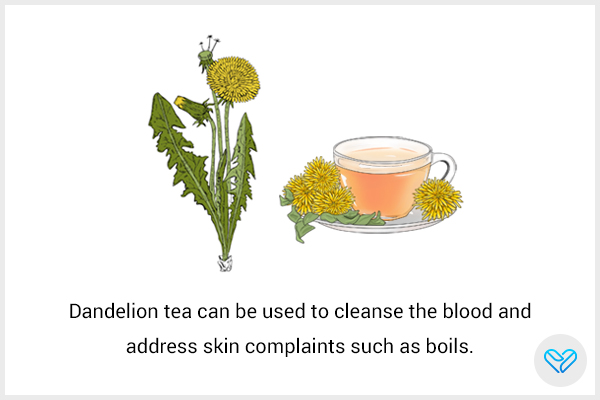
Dandelion extracts are generally safe and permitted for use in food products and as dietary supplements.
Dandelion can be used in various forms, such as powdered plant parts, herbal tea infusions, fluid extracts or tinctures, and fresh-pressed plant juices, for relieving dermatological conditions such as eczema and noninflammatory skin disorders. It can also be used to cleanse the blood and address skin complaints such as boils. (4)
Dandelion is considered a safe product by the Food and Drug Administration for people with rare allergies. However, it is important to limit the dosage of the aerial parts of the plant (such as flowers and leaves) to 4-12 g per day and the root to 1-3 g per day. (5)
6. Dandelion tea for hair loss
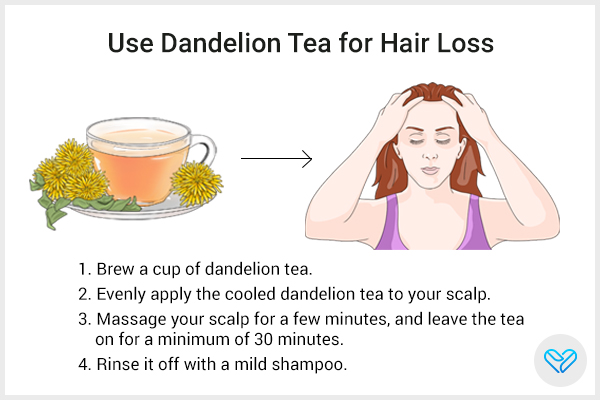
Dandelion tea is one of the many herbal preparations that are employed to stimulate hair growth and discourage hair loss, according to dermatologists and researchers. (6)
How to use dandelion tea for hair growth:
- Brew a cup of tea.
- Evenly apply the cooled tea to your scalp.
- Massage your scalp for a few minutes, and leave the tea on for at least 30 minutes.
- Rinse it off with a mild shampoo.
7. Dandelion tea for dandruff
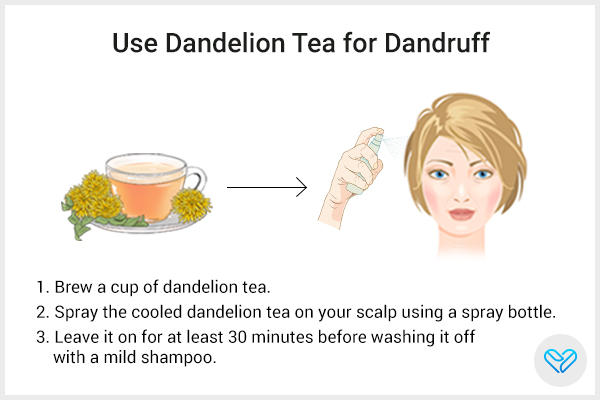
Dandruff is a frequent issue that affects the scalp and can cause discomfort and embarrassment. According to experts, using dandelion tea can aid in reducing dandruff and maintaining a healthy scalp.
How to use dandelion tea for dandruff:
- Brew a cup of tea.
- Spray the cooled on your scalp using a spray bottle.
- Leave it on for at least 30 minutes before washing it off with a mild shampoo.
Precautions While Using Dandelion Tea for Your Skin and Hair
Using herbs for medicinal reasons has been an age-old practice and has been around for more than a hundred years. But it’s crucial to be conscious of their probable side effects and interactions with other medications.
Dandelion is typically deemed to be safe, but some people may experience an allergic response or mouth sores when using it. It’s also important to avoid dandelions if you’re allergic to iodine or certain other plants, such as chamomile, marigold, and chrysanthemum.
Dandelion may also result in an increase in stomach acid, heartburn, or skin irritation in some people. Moreover, those with kidney or gallbladder troubles should confer with their physicians before utilizing dandelion. (7)
Most-Asked Questions
Is dandelion tea safe for pregnant women?
Pregnant women should consult with their healthcare provider before consuming dandelion tea.
Can dandelion tea help in reducing dark circles?
Dandelion tea may help in reducing the appearance of dark circles.
Final Word
Dandelion tea has been used for centuries as a natural remedy for various health conditions, including skin and hair issues. It can be used in various ways, including as a toner, hair rinse, and spray.
It is best to do a patch test before using it on your skin or hair.
- Was this article helpful?
- YES, THANKS!NOT REALLY


